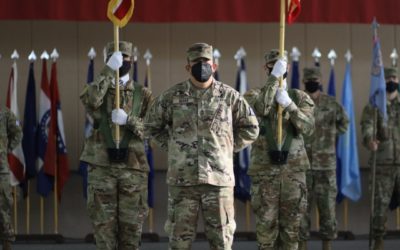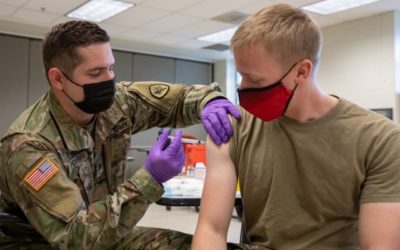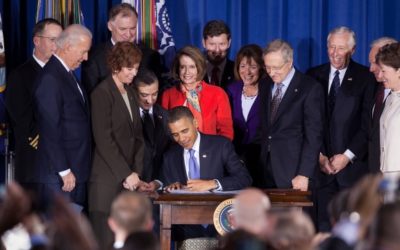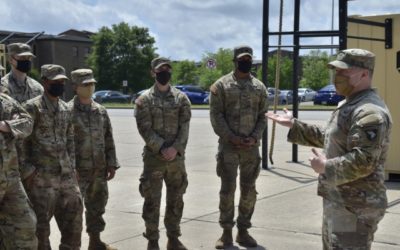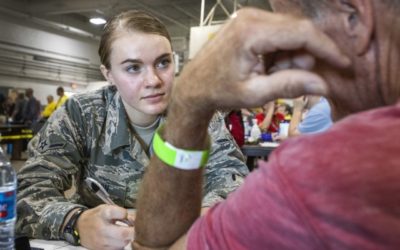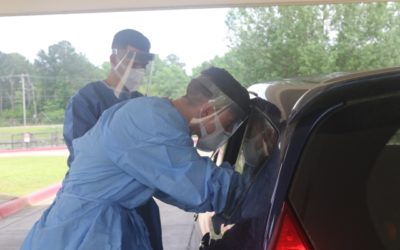MHS provides universal healthcare to beneficiaries, reducing barriers to medical care access. That appears to be especially beneficial for military beneficiaries facing a colon cancer diagnosis and treatment.
Healthcare Quality Assurance Programs Again Found Lacking by OIG Report
The quality, safety and value (QSV) programs in some VA facilities continue to fall short, according to a new VA Inspector General report.
Seizures Appear to Signal Worse Cognition in TBI Patients
For hospitalized patients with moderate to severe traumatic brain injuries, more than half have seizures and abnormal periodic or rhythmic patterns observed on continuous electroencephalography monitoring (cEEG).
Battlefield Blast Exposure Linked to Mental Health Effects
Chronic mental health symptoms including post-traumatic stress, depression and neurobehavioral issues increase proportionately with blast exposure severity, according to a new study.
New Focus Is on Taking Care of Victims of Military Sexual Assault
As DoD officials look to make good on President Joe Biden’s promise to address sexual assault and harassment in the military, they are framing a portion of that effort in terms of a pressing public health need.
More Epilepsy Counseling, Education Needed at VA
While care of epilepsy patients tends to be high quality at the VHA, not enough emphasis is placed on education and counseling, according to a new study.
Military Bases Add Additional Restrictions to Help Stem COVID-19 Spread
U.S. military bases around the country—and some around the world—have begun to increase health protection measures to guard against the surge in COVID-19 cases due to variants, such as delta, that have been spreading for months.
Immunologic Resistance Used to Predict COVID-19 Outcomes in Veterans
Is it possible to predict which COVID-19 patients will advance to severe disease? A new study involving VA researchers suggested that the answer is “yes,” using the concept of immunologic resilience.
Military Sets Deadlines for Receipt of Mandatory COVID-19 Vaccine
By mid-December, all U.S. active-duty servicemembers will either be vaccinated against COVID-19 or have received an approved exemption from their service branch.
Patients With Uncontrolled HIV Face Higher Risk of Sudden Cardiac Death
A new veterans study underscored the critical need for viral suppression and heart disease risk factor modification among HIV patients. Researchers determined that those with sustained viremia or low CD4 cell counts had an excess risk of sudden death.
Racial and Ethnic Disparities Identified in Rates of Severe Influenza
Marked racial and ethnic disparities in COVID-19-associated morbidity and mortality have raised important questions about racial and ethnic differences associated with other respiratory viral infections, including influenza.
LGBTQ Veterans Ousted By ‘Don’t Ask, Don’t Tell’ Eligible for VA Benefits
VA Secretary Denis McDonough sent guidance to Veterans’ Benefit Administration adjudicators restating that veterans who were given other than honorable discharges under the military’s former Don’t Ask, Don’t Tell (DADT) policy are eligible for the full range of VA benefits.
Lang Tests Alternative Methods to Help Veterans Recover From PTSD
Every veteran suffering from post-traumatic stress disorder has a different experience—a different collection of symptoms, interacting in ways unique to that veteran’s life and experience.
Veteran Suicides Dropped in Latest Statistics, Reversing Steady Increases
According to VA’s 2021 National Veteran Suicide Prevention Annual Report, veteran suicides dropped in 2019, reversing the steady rise seen in previous years.
White River Junction VAMC Pilots WHO Suicide Prevention Program at VA
After 18 months of pandemic disruption and isolation, International organizations are urging governments, health systems and nonprofits to prioritize suicide prevention. The VA may have just the program.
Navy Study Suggests Post COVID-19 Symptoms Can Affect Military Readiness
At 0.2% percent, the military’s current COVID-19 mortality rate is far lower than that of the general American public, which is just under 2%. But often those who contract and survive COVID-19 have to live with its long-term effects, regardless of the severity of their acute illness.
It May be Said with Truth that Man is always Susceptible of Improvement
I have had the good fortune to live in a classic Annapolis, MD, community blessed with an old-growth forest that exists throughout this Chesapeake bayside development. Many of these trees are black and chestnut oaks consisting of numerous specimen trees greater than 100 years old. My wife and I have managed to stay in this community since 2007. This is the longest I have ever lived in one place in my entire life.
Veterans Study Finds That Kidney Disease Is Common ‘Long COVID’ Outcome
Patients who recover from COVID-19 often suffer long-term consequences. One of the most dangerous, according to a new veterans’ study, is the detrimental effects on kidney function, which might affect hundreds of thousands of survivors.
Veteran Was Missing for Almost a Month Before Decomposed Body Found
On June 12, 2020, a badly decomposed body was found in the emergency exit stairwell of the Bedford Veterans Quarters (BVQ), a privately operated, independent living facility on the campuses of VA’s Edith Nourse Rogers Memorial Veterans Hospital.
Too Few Veterans Get Concurrent Chemoradiation Therapy for Stage III NSCLC
Compared to the general U.S. population, VHA patients tend to be older, have lower levels of income and education and have a higher comorbidity burden.
With a National Housing Crisis, Veteran Homelessness Remains a Concern
From 2010 to 2016, the number of veterans living on the streets dropped by half and the ending veteran homelessness within a decade appeared feasible.
Challenges in Optimizing Therapy for Older Veterans With Stage 1 NSCLC
According to a recent report, 30% of VHA patients qualified for lung cancer screening and reported at least two significant comorbidities.
Waiting More Than 12 Weeks for Surgery Can Be Risky for NSCLC Patients
A retrospective cohort study of 9,904 VHA patients with clinical Stage I NSCLC determined that surgical procedures delayed more than 12 weeks from the date of radiographic diagnosis were associated with increased risk of recurrence and worse overall survival.
How Mandatory HCP Vaccines Affect Infections
The VA led the way among federal agencies in requiring front-line health workers to be vaccinated against COVID-19. It later expanded the requirement to most VHA employees, volunteers and contractors who work in those facilities or come in contact with veteran patients and healthcare workers as part of their duties.
COVID-19 Shots Protected VA Cirrhosis Patients
Administration of mRNA COVID-19 vaccines to veterans with cirrhosis resulted in a delayed and modest reduction in infection rates. Excellent protection against related hospitalization or death was achieved, however, according to a new study.
No Link Between AMI, Two-Dose HBV Vaccine
The overall prevalence of chronic hepatitis B infection in the United States is estimated to be around 1.59 million That’s one of the reasons the DoD, which has required hepatitis B vaccination for new recruits for nearly 20 years, added the mandate for existing servicemembers to receive the vaccine in 2014.
AMA, Other Physician Groups Strongly Oppose New VA Standards of Practice
Partly spurred by the COVID-19 pandemic, the VA late last year released an interim final rule clarifying that VA nurses and other healthcare professionals can deliver services in a state other than their state of licensure, registration or certification.
Unexpected Benefit for Minority Veterans: Easier Access to COVID Testing
The COVID-19 pandemic laid bare the impact of disparities in access to healthcare and ongoing differences in the seriousness accorded to minority patients’ health concerns. It also revealed significant benefits of receiving care through the VA.
VA Will Use Rescue Funds to Digitize Records Used for Veteran Claims
The VA will use millions of dollars from its American Rescue Plan grants to expand the scope of the digitization of federal records. One key goal is to reduce a backlog of record requests created by the COVID-19 pandemic.
Veterans Receiving Total Knee Replacements at VA Facilities
Thanks to the MISSION Act, VA is increasing purchasing healthcare for veterans in the communities where they live.

